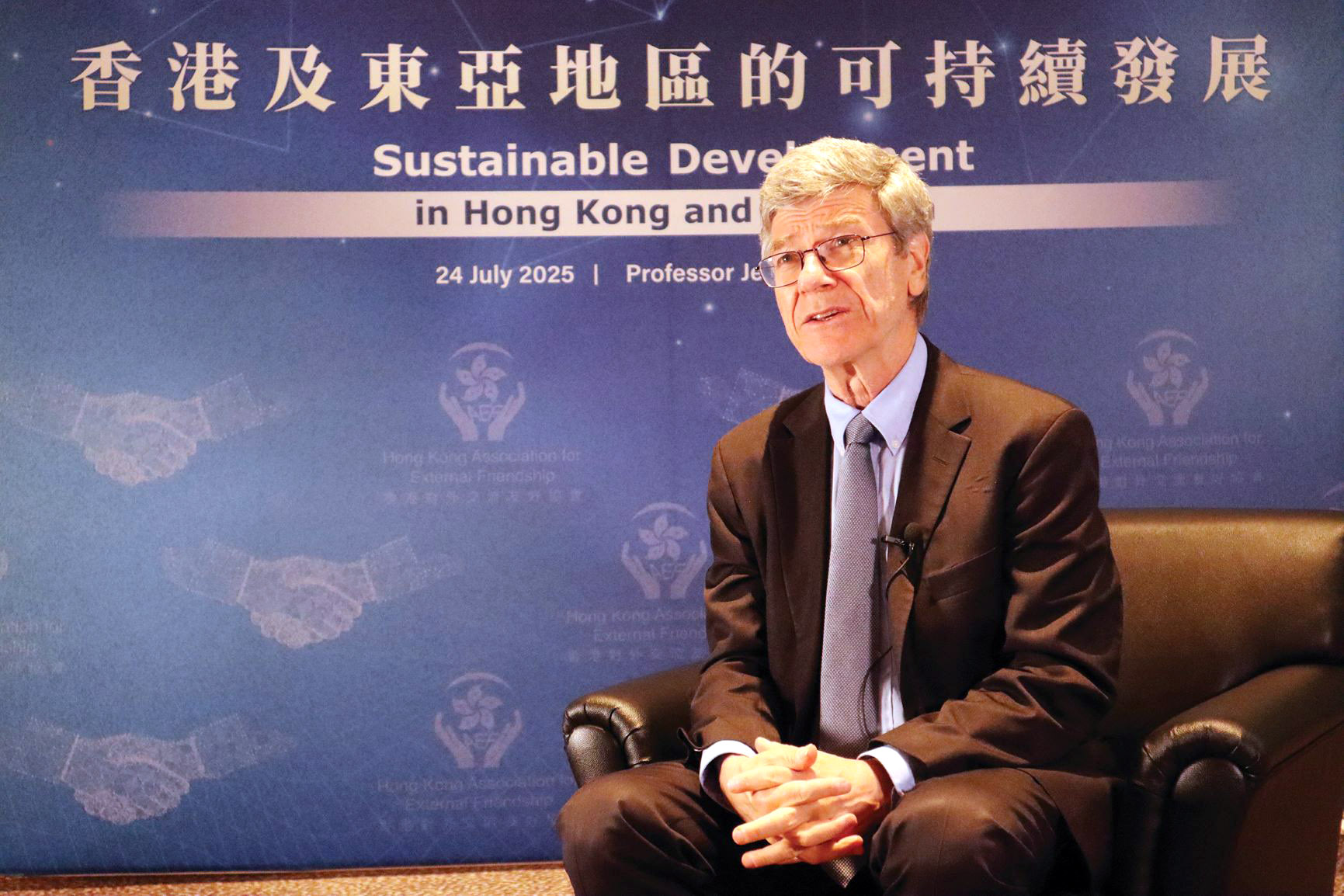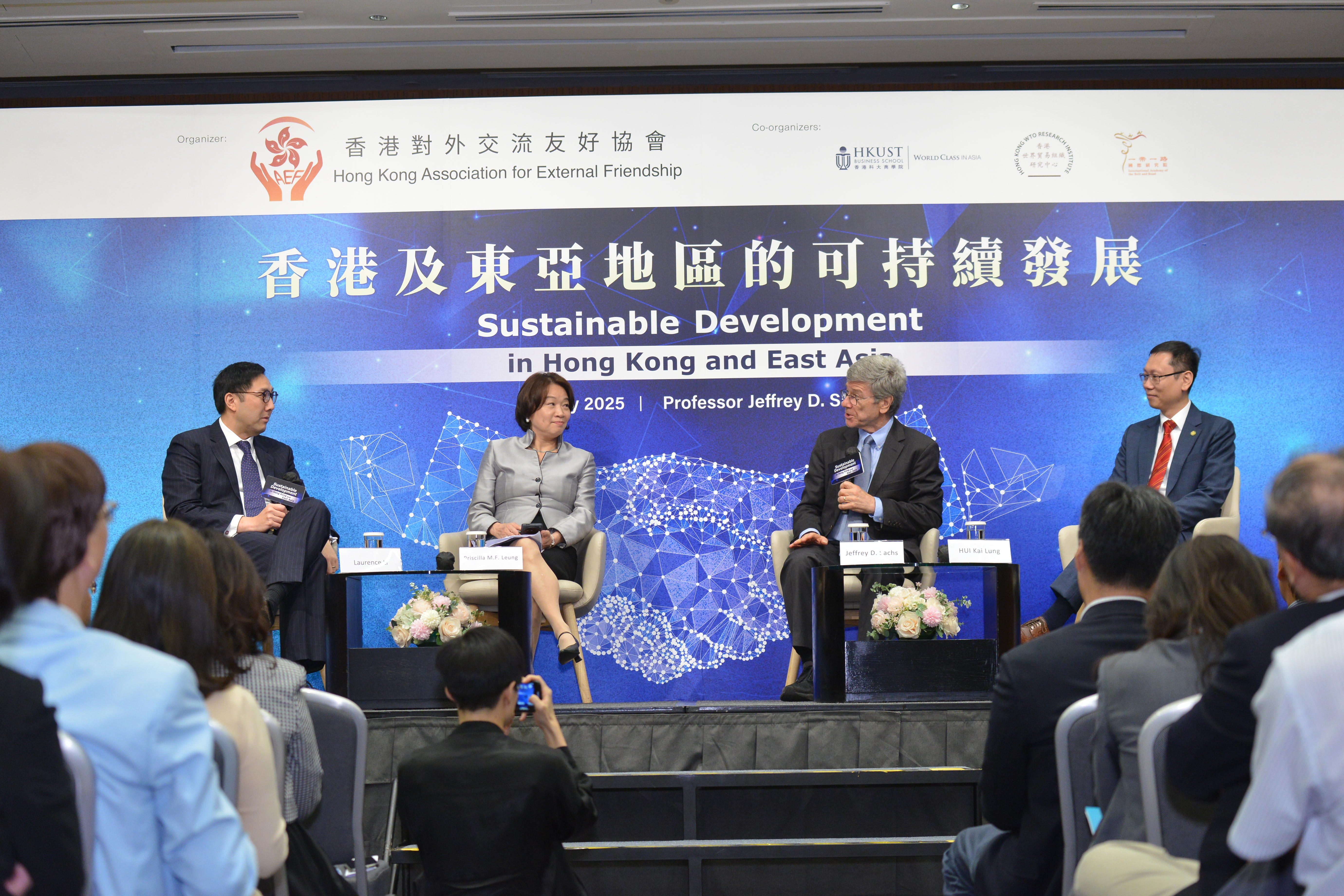
Silicon Valley, the epicenter of global innovation, is “nothing compared to the Guangdong-Hong Kong-Macao Greater Bay Area (GBA)” when it comes to producing practical, cost-effective technologies and solutions for the often-overlooked, underserved parts of the world, said US economist Jeffrey Sachs.
 China has its own answer to the global development model that has long followed a Western script. The world’s second-largest economy has what it takes to stand as a flag bearer and agenda setter in the realm of collective sustainable development, with the Hong Kong Special Administrative Region anchored as a unique hub for green finance, Sachs said.
China has its own answer to the global development model that has long followed a Western script. The world’s second-largest economy has what it takes to stand as a flag bearer and agenda setter in the realm of collective sustainable development, with the Hong Kong Special Administrative Region anchored as a unique hub for green finance, Sachs said.
“China, a fundamental pillar of multilateralism, should have its position reinforced,” Sachs, director of the Center for Sustainable Development at Columbia University, told China Daily in an exclusive interview in Hong Kong following a speech event hosted by the Hong Kong Association of External Friendship.
READ MORE: Greater Bay Area — China’s path to Silicon Valley 2.0?
Hong Kong’s uniqueness, said Sachs, lies in its geographical advantage — strategically located within the manufacturing and innovation powerhouse of the Greater Bay Area, and more closely aligned than ever with the country’s pivotal role in shaping profound global transformation.
During his recent visit to Shanghai, Sachs was impressed by the artificial intelligence-powered factory of Longi Green Energy Technology, one of the world’s largest solar panel manufacturers. The fully automated facility and bustling scene of robotic manufacturing just offered a glimpse into how China’s industrial might and tech prowess could engineer a meaningful impact.
The world-renowned professor has also been a frequent visitor to Shenzhen, a vibrant and innovative city that is home to a constellation of tech giants — including many iconic enterprises that have been targeted by the US in its campaign to curtail China’s technological ascent.
Sachs was equally impressed by the increasingly strong connection that has developed between Shenzhen and Hong Kong over the past few years. He lauded the closer ties between neighboring cities across the Greater Bay Area as “an offering” to Hong Kong, enabling the city to stand out from other financial centers and pursue “something much bigger”.
The SAR is “best placed” and blessed in every sense under the “one country, two systems” principle, with its robust common law framework, well-established financial regime, world-leading education institutions and some of the finest minds, as well as the neighborhood it is situated in. “The neighborhood does give a scale,” he said.
“At the most fundamental level, sustainable development depicts a future we have for the world,” Sachs said. The concept can be traced back to endeavors decades ago, and its lofty goals were adopted by the United Nations (UN) in 2015 as a universal call to action.
Sachs shared his reflections on sustainable development: It is “a system of systems” with interconnections among various fields. It cannot be achieved with markets or capitalism alone, and thus calls for holistic planning, regional strategies and a global agenda.
This understanding makes him a keen advocate and staunch supporter of global cooperation and shared prosperity. But he pointed to the cruel fact that Wall Street is turning a blind eye to the huge, unmet demand from developing economies. This is where Hong Kong could come into play — by providing a whole package of financing support and setting itself apart from its peers as a financial hub that connects East and West, North and South, he said.
Such a unique mission for the territory fits in well with the goals and undertakings of the Belt and Road Initiative (BRI), which Sachs describes as his “favorite single foreign policy in the area of sustainable development”.
“This well-motivated initiative is becoming much more strategic, green, digital and transformation-focused. It’s a big offer for the world,” he said.
Sachs said he is pinning his hopes on China — “by far the world’s largest industrial nation and the lowest-cost producer of every advanced green and digital technology that the globe needs” — in driving a more inclusive, equal and sustainable development that benefits those most in need.
The prominent scholar looks beyond the West to “the rest of the world”. “It’s not a small ‘rest of the world’ that can be taken lightly,” he said. “Instead, it accounts for approximately 85 percent of the world population in total. Or if you take away China’s part, it’s about two-thirds of the global population.”
Those countries and regions that have been “left behind” are banking on China as “a natural leader and the most important producer of key technologies and solutions” to hook onto sustainable transformation. They are also in dire need of multiple lanes of funding that the SAR can help provide, said Sachs.
Within an emerging global landscape of multi-currency transactions and decentralized financial systems, he is betting on the yearlong efforts that China has put in to make its currency more international, and on the SAR’s pursuit of stablecoin pilots to stay on the leading edge of financial technology.
Sachs reiterated his prediction that “a decade from now, the role of the dollar will be much less than it is today”. However, such a sea change is “not entirely straightforward as it requires new institutions”. He highlighted stablecoin and digital currencies as integral parts of the big story unfolding, with the well-paced internationalization of the renminbi adding the most compelling footnote.
In the evolving realm of global trade, the massive, untapped “rest of the world” is expected to be “a main source of export growth” for China over the coming few years, as Sachs sees “no real stability and much less true cooperation between the United States and China” in the years to come.
The clock is ticking for a trade deal between the world’s two largest economies, with the current 90-day tariffs pause set to end on Aug 12. The two countries started a fresh round of talks on Monday in Sweden.
Sachs said the US “has become alarmed that it cannot win such a trade war” and China’s advanced chipmaking — a flashpoint in the Sino-US technological rivalry — will continue to develop regardless of the short-term twists and turns.
READ MORE: Greater Bay Area offers Hong Kong myriad opportunities

Having seen the US sink into self-imposed isolation with a mindset “not conducive to cooperation”, he urges the rest of the world to adapt to the new reality and double down on their commitment to multilateralism.
The Trump administration said last week that it will pull the US out of UN cultural agency UNESCO — for the second time, having previously broken ties with the agency in 2017 under the first Trump administration — following its withdrawals from the Paris Agreement and the World Health Organization (WHO).
Sachs said he expects to see a greater UN presence in China, with the nation hosting a significant UN campus focused on sustainable development and energy transformation.
Contact the writer at sophialuo@chinadailyhk.com


